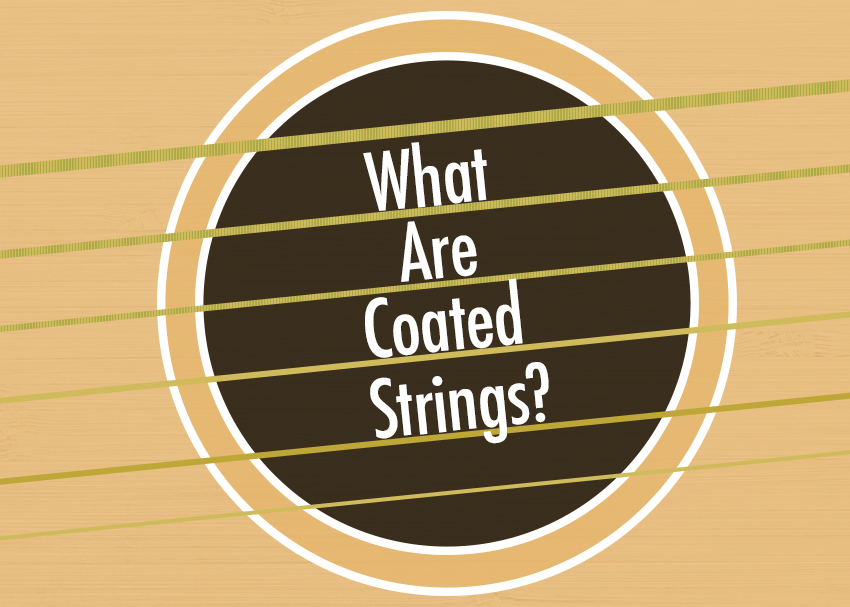Have you come across coated strings while shopping for your next pack and wondered what they were? The world of strings is wide indeed, and coated strings are one of the many varieties offered by manufacturers. But what is a string’s coating made from? How does it affect the tone, and does it feel…weird? Let’s shed some layers, hang up the unhelpful myths, and unzip the truth of what coated strings really have to offer.
What is the “Coat” Made From?
First, “coated” is a broad, industry term for strings that feature a super-thin outer layer. Many manufacturers use this term, but you may also hear “treated,” “enhanced,” or other terms used to describe the same process.
This recipe for string coating is unique to each manufacturer, but it is generally a thin layer of polymer that runs along the length of each string. And perhaps its better to think of “coating” as more of a “film” — D’Addario claims their XS series of strings feature a coating that’s 10 times thinner than a human hair!
Related: What Are Flatwound Strings?
Curious about what flatwound strings have to offer? Learn more about their unique feel and sound in this blog post! | Read »
What’s Good About Coated Strings?
The big benefit most players claim for coated strings is their longer lifespan. This refers to both the string’s ability to last longer before breaking, and the ability to retain a brighter sound for a longer period of time.
If you’ve ever re-strung a guitar, you’ve probably noticed how bright and snappy it sounds…at first. A few days later, the tone will be noticeably duller. That’s because the more you play, the more dirt and grime accumulates inside the grooves of the string’s wrap wire. Eventually, the string may get so worn down by contact with the bridge or your pick that it breaks! The added layer of protection on coated strings helps them resist dirt buildup for longer and helps smooth out the points of contact on your guitar’s hardware, so players who use them, don’t typically need to change strings as often.
Some players also enjoy the feel of a coated string. Again, the polymer coating can make the grooves in roundwound strings feel less pronounced, making sliding and moving up and down the fretboard feel just a little smoother.
What Do People Not Like About Coated Strings?
First and foremost, the biggest deterrent to players buying coated strings is the price. Coated strings typically cost more than their non-coated counterparts, but your higher initial price for coated strings can lead to savings down the road, thanks to their longer lifespan.
The next most commonly heard complaint is the feel of coated strings. While incredibly thin by definition, string coating can still be felt and some players notice their string coating more than others. Many are apt to label this feeling as “slippery.” The other common argument against coated strings is that they sound inherently different than non-coated varieties. In particular, players often describe the tone of coated strings as dull and/or lacking in harmonic richness.
Are Coated Strings Right for You?
It’s worth noting, that the both pros and cons above are subjectto each individual player’s preference, style, and needs. What one person might dislike in their coated strings, another may see as an improvement. Only you can decide for yourself, so if you’re new to coated strings and curious about them, why not give them a try?
What are Some Good Coated Strings?
As stated before, coated strings are made by all of the major string manufacturers, and each has a slightly different recipe. Elixir is possibly the brand most associated with coated strings — all of their offerings for acoustic, electric, and bass are coated! Their Nanoweb coating maintains the natural tone of your guitar, just extending its lifespan, while Polyweb coating offers a warmer, more vintage sound, and Optiweb delivers the brightest tone of the three. D’Addario’s coated offerings include XT line with high-carbon steel core wire and the XS line, which have NY steel cores like their premium NYXL series. DR Strings uses a proprietary, ultra-hard K3 coating that gives their Dragon Skin strings exceptional tone and resitance to buildup. They also use K3 coating on their goth-approved Black Beauties strings! Ernie Ball’s Coated Slinky strings not only feature corrosion-resistant coating, but the plain strings are reinforced with ultra-tough titanium. And masters in acoustic tone Martin are in the coated string game with their exclusive Lifespan 2.0 formula, which aims to never compromise tone.
Ready to coat up? Find strings from these and other brands at zZounds!





Leave a Reply